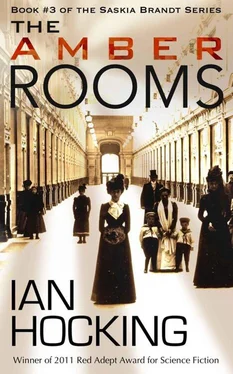Then she saw a laboratory bench with a beaker of water on top. Two electrodes had been lowered into the water. Around the first gathered bubbles of oxygen; around the second, hydrogen. Just so. The i-Core had found a way to give her sufficient oxygen for consciousness.
Why haven’t I returned to the future? What happened to the band? Is it malfunctioning?
Another image brightened in her mind: an old sycamore that had been split halfway down its trunk during a forgotten lightning storm. Then: a trampled pocket watch on a St Petersburg street.
OK, it’s malfunctioning. What do I do now?
The answer to this question was a memory that might have been true: kicking towards the faraway surface of Lake Baikal, digging upwards at the water as through scrambling from a grave, and achieving the surface, pulling down a great breath.
I don’t understand.
Saskia stumbled against the model. The pain in her knees was sharp. It hurt to blink, and when she looked at her hand in the firework light, she saw the mottled pattern of bruising.
Again, the i-Core presented her with that memory of the trampled pocket watch, which was followed by the penetration of her head through the surface of Baikal.
Not helpful , she thought, leaning more heavily on her arm. She felt sleepy. Dead already. She wished to die next to Pasha, so she moved towards him. His eyes were half open and amber light reflected there. Saskia frowned. She turned in the direction of the main staircase. In the mirrors either side, and in the pressed gold and in the amber, she saw what could only be the blue-grey light of day. Was this another metaphor? Her failing mind struggled to understand what the reflection meant. She fought to concentrate, and with a childlike flash of achievement, understood that the light was coming from behind her.
She shuffled around. Her muscles quivered and burned with pain.
The door to the enfilade was open. Through it, where the next room in the suite should have been, was a second Amber Room. Snow was falling.
Saskia stepped onto a soft ramp of snow and took a breath. She did not step further. This Amber Room had been open to the weather for months. Its windows were smashed and overlooked a palace square that was strewn with tents, burned vehicles—automotive—and flaming drums. It was the invading German army. The sky was smoke-stained. She looked at the snow around her skirt. It was dirty. The walls of this Amber Room were naked brick. The floor had been ripped down to the underboards. The ceiling was torn and hanging. No amber remained.
She heard distant motor traffic and the tap-tap of a pistol. Overhead, an aeroplane droned, engines ill.
As Saskia stepped into the room proper, she looked back through the enfilade. There was no sign of the original Amber Room, only an empty doorway whose door had long become firewood and through which the wrecked enfilade continued. She crouched in the snow-rubble and looked, from under her purple hat, at the German soldier who tended a stove in the centre of the floor. He wore white trousers over his jackboots, a dirty, pale jacket that wrapped him like a tunic, and a peaked cap. His shoulder boards indicated that he was a sergeant. He held a white mitten in his mouth while his hand moved a ladle in the watery broth. His stirring motion continued as Saskia crouched.
In German, she asked, ‘Can you hear me?’
The soldier moved his ladle a quarter turn. Only then did he look at her. His brown eyes were dark and his cheeks recessed and mottled. His stubble had not yet spread from his upper lip and chin to the rest of his jaw. On the basis of this, Saskia put his age at twenty years.
‘I remember you,’ he whispered. His voice sounded as though he had been crying. ‘Did you think I wouldn’t? Have you forgotten me? Your Michael?’
‘I’m far from home, Michael. I need your help.’
His eyes stayed towards the soup. ‘Do you want some?’
‘No. That’s for you.’
‘It’s stone soup,’ he whispered, and that was enough for Saskia to feel all his pains, the waste of him, the unstructured and unstoried deaths of his friends, and the cold. The snow fell onto the lid that half-covered the soup. ‘Do you know the story?’
‘Of stone soup? No, tell me.’
‘I can’t. The boys will think I’m mad. Ssss. Quiet.’
‘Who am I, Michael?’
‘You are my Katrin from home.’
‘Home in?’
‘Schliersee.’
Saskia smiled. ‘Yesterday, I walked on the banks of the lake with our friends.’
Michael’s jaw shifted to the right. His moustache shook. When the tears gathered in the edges of his eyes, they did not fall. Saskia reached towards him—wincing at the pain in her shoulder—and thumbed them away.
‘Is this the Great Summer Palace?’
‘No,’ he said, quietly. ‘It’s the Catherine Palace.’
‘What happened here, Michael?’
‘We finished stripping the amber,’ he said. His eyes were unfocused. ‘Today, it’ll go home.’
‘No, not the amber. What happened to the palace?’
Michael looked at her, as though into bright light. ‘I’m not mad. You’re not Katrin.’
‘No,’ she said, smiling.
‘You need to leave before the boys come.’ Michael nodded towards the door that led to the Apartments of the Empress Maria Fyodorovna. ‘They haven’t seen a woman like you for months.’
‘I will.’
He nodded, then said, ‘What happened to your face? Did someone hit you? Was it one of us?’
Saskia touched her cheek. It was swollen.
‘No, Michael,’ she said. ‘It wasn’t.’
He breathed deeply and looked at his stone soup.
‘Don’t cry, Michael.’
He sniffed. ‘Then what?’
Saskia rose. Her blackcurrant skirt drew in. She took careful steps towards the open throat of the enfilade and stepped into the doorframe. Beyond it was a third Amber Room. As she passed, there was no sensation of travel through time. Only the physicality of her environment changed. From cold to warmth; steady to unsteady; quietude to noise. Her heel wobbled on a loose board as she
~
tipped into herself, a young woman in the back seat of a police car. It was night. Her seatbelt cut into her hip as the car undertook a queue of stationary traffic, groaned across the rumble strip, and continued along the hard shoulder. The car slowed. Its siren muted, but the blue lights flashed over the parked cars, flashed across their curious passengers. Next to her, a tall, fifty-something man wiped his forehead with the back of his hand. Sweat collected against his collar.
Where am I? Saskia thought. She recognised the man next to her as a British police officer called Jago. She had last seen him at Heathrow Airport in the year 2023, where they had chased a criminal called David Proctor. Jago had collapsed at the terminal while Saskia boarded Proctor’s aeroplane to Las Vegas, to a US government programme called Project Déjà Vu, and backwards in time to the year 2003.
‘Jago?’
The man turned to her. ‘It’s Jago now, is it?’
I call him Scotty. Something about Enterprise . A joke.
‘Are you feeling all right?’
‘I’m fine. But there’s an accident up ahead.’
The car tipped forward as the driver braked to avoid the edge of a wide vehicle. Saskia took Scotty’s hand. He smiled.
‘You’re not still worried about the driving?’ he said.
‘No,’ she said. ‘I’m worried about
(Whether we’ll reach Proctor in time)
you.’
Scotty smiled. The expression seemed unsuited to his face. ‘Why do I always get the daft ones?’
‘Sorry.’
Читать дальше












